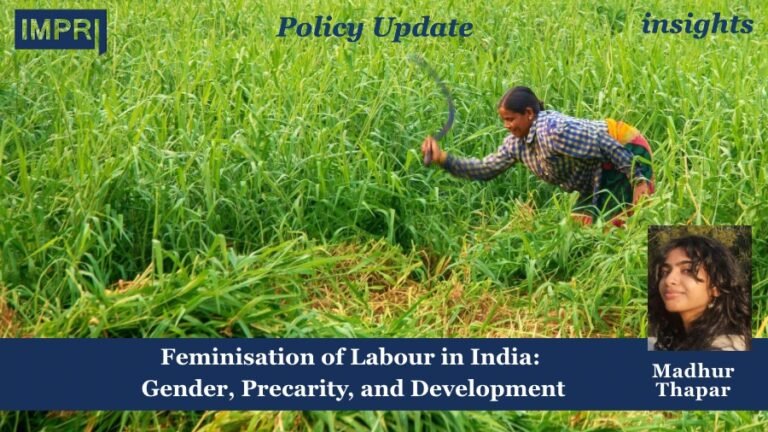Policy Update
Devananda S
Context
Seeds are the foundation of the food chain and vital for agricultural strength, encoding genetic traits that ensure plant survival across generations. They hold significant biological and economic value, providing essential nutrients for growth and serving as crucial food sources worldwide. It is the basic input for successful agricultural production, making it crucial to ensure their purity and quality at every stage of seed production.
To safeguard the quality of seeds and planting materials, the Government of India has implemented several laws and policies. These include the Seed Act (1966), Seed Rules (1968), Seed (Control) Order (1983), New Policy on Seed Development (1988), the Plants, Fruits & Seeds (Regulation of Import into India, 1989), the PPV & FR Act (2001), the Essential Commodities Act (including Seeds, 1955), the National Seed Policy (2002), the Seed Bill (2004) and Seed Bill (2010).
The Seed Bill 2019 was finalized with the goal of regulating seed quality and improving the production and distribution of seeds to farmers. This legislation aimed to enhance competition by amending the Seed Act of 1966 and the Seed Rules of 1968. The Ministry of Agriculture and Farmer’s Welfare had put the bill, in 2019, in the public domain for feedback and comments. But the Bill sparked strong debates, similar to those seen with its earlier versions in 2004 and 2010.
History
The Seed Act of 1966 is the foundational piece of legislation in India that regulates the seed sector. Enacted to ensure the quality and purity of seeds, this Act establishes a legal framework for seed production, distribution and certification. The key legislative measures under the Act include the Seeds Rules established in 1968 and the Seeds (Control) Order introduced in 1983, which incorporated seeds as an essential commodity. The Seed Act was passed by the Indian Parliament on 29th December 1966 and it came into force from 2nd October, 1969. Here are the key aspects of the Seed Act, 1966:
- Notified varieties
It is applicable only to notified kinds/varieties of seeds and vegetatively propagating materials used for sowing. - Central Seed Committee
Outlines the committee’s functions, including setting seed testing fees, advising on laboratory suitability, and recommending certification and testing standards, along with details on allowances and travel expenses. - Central Seed Laboratory
Details the laboratory’s responsibilities, such as coordinating with State Seed Laboratories for consistent test results, collecting market seed quality data, and other tasks assigned by the Central Government. - Seed Certification Agency
Describes the agency’s functions, including application procedures, overseeing seed growth and processing, maintaining a list of recognized nucleus seed breeders, inspecting production fields and issuing certificates. - Marketing or Labelling
Lists marketing requirements, such as including the producer’s name and address on seed labels, along with germination rates, purity levels, net weight, testing dates and treatment status. Producers are responsible for the accuracy of this information. Transparent transport covers do not need labelling. - Powers of the Controller
The Controller can direct producers or dealers to sell or distribute seeds in a specified manner in the public interest. - Seed inspectors and Seed analysts
The State Government can appoint inspectors to exercise jurisdiction over a local area. - Certification
Foundation seed, Registered seed and Certified seed on the basis of the standards of each class. - Sealing, Dispatch and Analysis of Samples
The details of sampling, labelling, manner of packing and sealing the samples as well as its dispatch to the seed analyst has been provided.
The Seeds (Amendment) Rules, 1973, modified the powers or seed analyst. The Seeds (Amendment) Rules, 1974, levied more power in the hand of seed inspectors during the time of a crop failure and The Seeds (Amendment) Rules, 1981, a new rule that comes under the seed certification, mentions the Indian Minimum Seed Certification Standards published by the Central Seed Committee to be referred for certification. The Seed (Control) Order that came in two years later was issued under the Essential Commodities Act of 1955.
In 1971, the National Commission on Agriculture recommended reducing the public sector’s dominance and allowing private sector entry into the Indian seed market. This led to the formulation of the National Seed Policy in 1988, aimed at privatizing the Indian seed industry, while imports of seeds were still restricted at that time. Plants, Fruits and Seeds Order (Regulation of Import into India order) 1989, regulated the import of plants, fruits, and seeds into India exclusively through designated customs stations, focusing on post-entry quarantine measures.
With an aim of notifying the varieties that claim protection, Protection of Plant Varieties and Farmers Right Act, 2001, was introduced. The seed bill 2004 was presented as a tool to address the concerns which the Seed Bill of 1966 failed to address. The Seed Bill 2010 provides for compulsory registration of kinds or varieties of seeds. Seed Bill 2011 was introduced with the primary objective to regulate the quality of seed for sale, import and export and to facilitate the production and supply of quality seeds. The latest of the Bills is the Seed Bill 2019, finalised by the Ministry of Agriculture & Farmers’ Welfare. But owing to several shortcomings this bill was also not passed.
Provisions in detail, Seed Bill (2019)
- Central Seed Committee
Authorised the Central Government to implement a Central Seed Committee to ensure the effective implementation of provisions. - Registration
All seed varieties available for sale must be registered and must meet specified minimum standards. For example, transgenic seed varieties must obtain registration under the Environment (Protection) Act, 1986, which can enhance accountability among seed companies. - Minimum Standards
Compliance to certain minimum limits of germination, genetic and physical purity, seed health and additional standards including that of the transgenic events. - Seed labels
Seed containers must include specific information on their labels. - Price Control
The government can set prices for specific seed varieties in “emergent” situations, such as seed shortages, significant price hikes, or monopolistic pricing practices. - Performance of seeds
Breeders would be required to disclose the “expected performance” of their registered varieties “under given conditions”. If the seed of such registered kind or variety “fails to provide the expected performance under such given conditions”, the farmer “may claim compensation from the producer, dealer, distributor or vendor under The Consumer Protection Act, 1986”. - Nurseries
Licence/Registration for nurseries. - Review of complaints
Consumer Protection Act, 1986 to be used to deal with complaints related to the non-performance of seed.
Major Criticism
The bill had to face many criticisms as a result of which it was not passed. The major criticism was regarding the registration of seed varieties. The requirement for every seed variety to be registered with the government is likely to create a costly and time-consuming process, making it difficult for farmers and seed companies to comply. This could marginalize enterprising farmers, particularly those looking to commercialize their own seed varieties, as they face heavy fines for non-compliance.
Giving farmers an exemption from registering seeds, the bill in future would legitimise only the seeds in the records but not the indigenous seeds of farmers, as stated as a major issue. In contrast to the Protection of Plant Varieties and Farmers’ Rights Act, which supports farmers’ varieties, the Bill does not distinguish between these and other seed types, failing to uphold traditional practices and local biodiversity.
The Bill focuses on scientific and legal standards for seeds but overlooks critical ecological, social, and cultural factors. The PPVFR Act requires complete data on parental lines and farmer contributions for seed variety registrations, facilitating beneficiary identification and benefit-sharing. In contrast, the Seeds Bill neglects this requirement, omitting crucial information about farmers’ contributions.
Standing committee emphasized the importance of farmers’ participation and specifically requested the inclusion of farmers’ representatives from various geographical zones in the Central Seed Committee. While the Bill included them, it diluted this demand by adding a qualification, stating that farmers’ representation would be on rotation. Government’s reluctance to involve farmers is visible through this.
The other major criticism points to it leaving the question of Genetically Modified seeds unanswered. The definition of transgenic variety is also unclear and lacks a scientific basis, indicating a significant gap in the Bill. The seed bill does not provide any mechanism to control seed supply or pricing, which could lead to increased costs and insufficient availability. The parliamentary standing committee on agriculture had firmly urged that the law incorporate regulations for both seed supply and prices.
The Protection of Plant Varieties and Farmers’ Rights Act (PPVFRA) allows farmers to claim compensation for seed failures, the Seeds Bill does not provide this recourse, requiring farmers to seek compensation through consumer courts under the Consumer Protection Act. This is particularly unfair, as navigating consumer courts can be challenging and costly for farmers, who may spend years pursuing compensation that might never materialize.
By shifting the responsibility away from the government, the Bill places an undue burden on farmers, forcing them to endure a difficult process for justice. Also, according to Bill, farmers are eligible for compensation if a plant variety fails to give expected results under given conditions. The fact that it is difficult to define the “given conditions” is not acknowledged.
Way Forward
Agricultural production relies on quality seeds; maintaining purity and standards is essential for success, necessitating strong legislation. Farmers must be informed about seed laws to understand their rights. Companies with national licenses should be permitted to conduct seed trials and generate data for product registration, facilitating quicker access to new research. The seed law should aim to regulate supply for farmers’ benefit while fostering the seed industry.
References
- PRSIndia. (n.d.). Seed Bill 2019. PRS India https://prsindia.org/files/bills_acts/bills_parliament/1970/Draft%20Seeds%20Bill,%202019.pdf
- Jafri, A. (2018, December). Politics of seeds: Common resource or a private property? Focus on the Global South, Indiahttps://ruralindiaonline.org/en/library/resource/politics-of-seeds-common-resource-or-a-private-property/
- PRSIndia. (n.d.). Seed Bill Update. PRS India https://prsindia.org/theprsblog/seeds-bill-update?page=5
- Jain, S. (2021, April 1). Explainer: Do farmers have reason to criticise the draft Seed Bill?https://thewire.in/rights/explainer-do-farmers-have-reason-to-criticise-the-draft-seed-bill
- Mandal, M. (2020, October 14). The problem with the draft Seed Bill 2019, for Indian farmers. The Wire tps://science.thewire.in/economy/agriculture/draft-seed-bill-2019-indian-farmers/
- Saggi, N. (2006). Seed Bill in India: Policy analysis and implications (CCS Working Paper No. 151). Centre for Civil Society.https://ccs.in/sites/default/files/2022-10/Seed%20policy%20in%20India.pdf
- Special Correspondent. (2020, January 30). Farmers oppose Seed Bill 2019, pass resolution against it: They fear dependency on patent-owning companies. The Hindu https://www.thehindu.com/news/national/karnataka/farmers-oppose-seed-bill-2019-pass-resolution-against-it/article30695726.ece
About the Contributor: Devananda S is a research intern at IMPRI, currently pursuing her BA Programme (Economics, Maths) from Delhi University.
Acknowledgement: The author would like to express my sincere gratitude to Dr. Arjun Kumar, Mr. Shivashish Narayan and Ms. Aasthaba Jadeja, for their valuable input in reviewing the article.
Read more at IMPRI:
Ministry of Agriculture and Farmers’ Welfare: A Pillar of India’s Agricultural Transformation
Mapping Ministry of Earth Sciences: Schemes and Initiatives- Part 1



